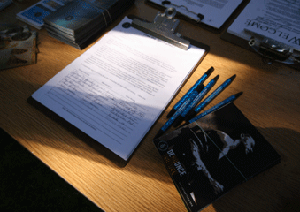PRISONERS OF CONSCIENCE
Help win the release of SEYOUM TSEHAYE
 They knew they were taking
a risk. When independent journalists in the East African nation of Eritrea dared
to cover the pressing issues of the day and express views that put them at odds
with the government, they knew their activities might not be appreciated by the
country’s repressive leadership. The authorities had been growing increasingly
intolerant of perspectives that veered from those of the country’s only
political party. Few people, however, anticipated the severity of the
government’s response when in September 2001 it arrested many of the country’s
leading journalists and political dissidents and banned all independent media.
More than four years later, most of those arrested continue to be held without
charge or trial in secret detention facilities, and Eritrea’s independent
newspapers remain closed.
They knew they were taking
a risk. When independent journalists in the East African nation of Eritrea dared
to cover the pressing issues of the day and express views that put them at odds
with the government, they knew their activities might not be appreciated by the
country’s repressive leadership. The authorities had been growing increasingly
intolerant of perspectives that veered from those of the country’s only
political party. Few people, however, anticipated the severity of the
government’s response when in September 2001 it arrested many of the country’s
leading journalists and political dissidents and banned all independent media.
More than four years later, most of those arrested continue to be held without
charge or trial in secret detention facilities, and Eritrea’s independent
newspapers remain closed.
Seyoum Tsehaye is 49, married with 2 children and has a degree in French Education from a colledge in Ethiopia. He is vwell known among EPLF veterans (Fighters and civilians). Seyoum was arrested late September 2001 in Asmara. He is reportedly in bad condition.
SPEAK OUT FOR HUMAN RIGHTS!
 Please send politely worded
letters to the President of Eritrea urging him to bring about the immediate and
unconditional release of Fessahaye “Joshua” Yohannes and the other detained
journalists.
Please send politely worded
letters to the President of Eritrea urging him to bring about the immediate and
unconditional release of Fessahaye “Joshua” Yohannes and the other detained
journalists.
Write to:
Read the joint letter from Amnesty International USA and nine other non-governmental organizations to the President of Eritrea calling for the release of 17 jailed journalistHis Excellency President Issayas Afewerki
Office of the President
PO Box 257
Asmara ERITREA
On September 18, 2001, with the world’s attention focused on the 9/11 attacks that took place days earlier in New York and Washington, Eritrean authorities launched their crackdown on dissent by detaining a group of senior officials of the ruling party, whose calls for peaceful political change had been covered by the independent press. The authorities suspended all of Eritrea's independent newspapers for allegedly “jeopardizing national unity” and detained many of the leading journalists.
None of those detained have been taken before a judge, provided legal counsel, or officially charged with an offense. The detained journalists staged a hunger strike in March 2002 to protest their detention. In response, officials transferred the detainees to secret locations. None have been heard from since. In addition to Seyoum Tsehaye, the detained journalists include Said Abdulkadir, Yosuf Mohamed Ali, Amanuel Asrat, Temesgen Gebreyesus, Mattewos Habteab, Dawit Habtemichael, Medhanie Haile, Dawit Isaac, Fessahaye Yohannes, Saleh Al-Jezaeri and Hamid Mohamed Said.
Amnesty International considers all to be prisoners of conscience and seeks their immediate and unconditional release from detention.
BACKGROUND
The internationally-recognized rights to freedom of expression, opinion and association are all but absent in Eritrea. Civil society is severely constrained. The formation of independent non-governmental organizations is generally not permitted. While the Eritrean Constitution allows for multiple political parties, the only political party currently permitted is the ruling People’s Front for Democracy and Justice. Even before banning the independent print media in 2001, the government had refused to allow any independent control of radio or television broadcast media. Faith groups are heavily restricted, and authorities have jailed a large number of people on account of their religious beliefs. International human rights organizations and media are frequently barred from the country.
Hundreds of political detainees remain held in secret locations in Eritrea without charge or trial. Detainees include former government ministers, journalists, religious believers, military personnel and civil servants. Although Eritrea has signed or ratified several important international and regional human rights instruments, it has failed in practice to abide by these obligations or by its own constitution. The courts are not independent or effective, and there is no legal redress for arbitrary detention or “disappearance.” Eritrean security forces commit human rights abuses with total impunity.
What is a prisoner of conscience?
A "prisoner of conscience" is someone imprisoned solely for the peaceful expression of their beliefs. The term was coined by Amnesty International's founder, civil rights lawyer Peter Benenson, who launched Amnesty International with an appeal on behalf of six prisoners of conscience.
